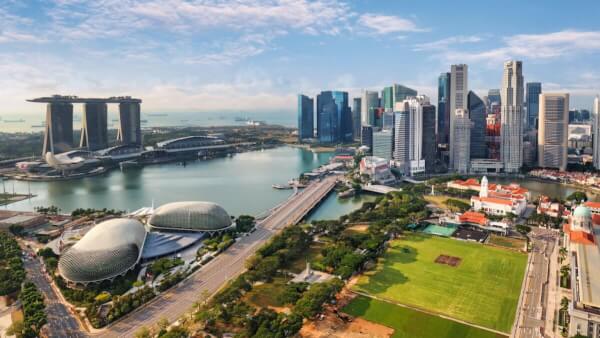Renting in Singapore as an American: Everything you need to know
Thinking about moving to Singapore? Find out what you need to know about renting in Singapore in this guide.

Singapore is a small but prosperous country. More than 33,000 babies are born there each year, and more than 16 million tourists visit each year. If you’re a foreigner or visiting expat in Singapore and you’re thinking about having a baby there, it’s important to understand the process and what your medical expenses might look like. Read on for a guide to the prenatal landscape in Singapore.
As opposed to having public healthcare and private healthcare options, Singapore offers maternity packages and subsidies for Singaporean citizens and permanent residents.
With packages, instead of paying per visit, you’ll pay a lump sum that covers a variety of appointments and treatments you’ll have. Prenatal packages are offered by most gynecologists, and they tend to cost anywhere from S$1,500 to S$2,000.
Singaporean citizens and permanent residents can deduct costs from prenatal care for their first 4 children. These subsidies come from what’s known as the Central Provident Fund (CPF). It's a savings plan for citizens to save for healthcare, retirement, and housing costs.
Costs depend on what type of maternity package you use and whether you give birth in a public or private hospital. Here are some average costs:
It isn’t uncommon for pregnant visitors and non-residents to give birth in Singapore. Expats residing in Indonesia and other adjacent countries often travel to Singapore for prenatal care. In fact, the Singaporean government has streamlined the process of visitors coming to the country for such purposes. To deliver your baby in Singapore, you should pre-apply for a visit pass and allow 4 to 5 weeks for your application to be processed.
Singaporean currency is the Singaporean dollar, written as ‘S$’ to distinguish it from other dollar currencies. It’s also seen by its currency code, ‘SGD.’ If you’re planning your budget and want to compare costs in S$ to your home currency, use an online currency converter.
| Baby delivery medical procedures in Singapore | Average cost - without insurance (SGD) | Average cost - with subsidies from Central Provident Fund (SGD) |
|---|---|---|
| Prenatal doctor visit and care | S$75-S$150 | S$0 - S$100 |
| Prenatal ultrasound | $100-$200 | S$0 - S$100 |
| Birth and delivery in the hospital | S$3,500 - S$12,000 | Total cost minus S$3,000 subsidy |
| Cesarean section in the hospital | Start at S$4,000+ | Total cost minus S$4,850 subsidy |
| Home birth and delivery with midwife | Rare | Rare |
Home births are rare in Singapore, so you’d most likely be giving birth at a public or private hospital.
The length of your stay will depend on your maternity package, but the standard offering is 2 nights for a normal vaginal birth and 3 nights for a birth by caesarean section. If you don’t have a maternity package and you’d like to save money, you could stay 1 night if everything has gone well for your delivery. A shorter stay means a lower bill. However, it’s never a bad idea to stay longer in hospital, where you’ll have access to nurses and medical staff.
Some common items that you’ll need may be available in hospital, but the availability of products and the policy of doling them out will depend on the hospital you’re in. To be extra prepared, you should pack the following items to bring to the hospital:
The following documents will come in handy at the hospital:
If you’ve just given birth, you can register your child at the hospital if your hospital is eligible, or at the Registry of Births and Deaths or at the Immigration and Checkpoints Authority (ICA). The turnaround for registration is relatively quick; you should register within 14 days of birth. If you wait until 42 days or longer, you’ll need to pay a fine and submit a letter of explanation for the delay. If you choose to have a non-parent register the child’s birth, you’ll need to write a letter of permission. You’ll also need the following for registration:
If your child is born in Singapore and has one Singaporean parent, they’re eligible for Singaporean citizenship. Both parents also need to be legally married at the time of the birth for the baby’s citizenship to be possible. Applications for naturalisation are considered for those born outside of Singapore and are considered on a case-by-case basis.
Singapore does not officially allow dual citizenship. Some acquire dual citizenship if they’re born outside of Singapore but move to Singapore at a young age. Foreigners who naturalise as Singaporean citizens must renounce their original citizenship.
Singaporean moms are entitled to 16 weeks of maternity leave - 4 weeks prior to birth and 12 weeks afterwards. There are some rules around this leave, though. You’re legally entitled to this leave if the child will be a Singaporean citizen, if you’re married to the child’s other parent, and if you’ve worked for your employer for at least 3 months prior to your child’s birth.
If you’re a foreigner, you’re entitled to 8 weeks of maternity leave, and your employer might also choose to fund another 4 weeks if you’re lucky. The government allows 2 weeks of paid paternity leave if you’ve worked for at least 3 months prior to your child’s birth, either for an employer or as a self-employed worker.
If you’re living between two countries, you’re often juggling priorities and logistics around your money. Wise is here to help you with your banking, bills, and currency exchange. Wise is a platform you can use to transfer money abroad, without the surprise charges, hidden fees, and marked up exchange rates that a bank charges. In fact, with Wise, you’ll get access to the same exchange ratesyou find on Google, no exceptions.
If you’re in Singapore, or any of the other 28 countries supported, check out the new borderless multi-currency account and associated debit card. The borderless account allows you to manage money in 28 different countries and 50+ currencies, including the Singapore dollar.
Singapore has excellent hospitals with global standards of medical care. If you’re having your baby there, you’re in good hands. Navigating a new system as a foreigner can be difficult, but Singapore has well-developed infrastructure for prenatal care and delivery. Refer back to this guide for your questions and concerns on pregnancy and delivery in Singapore.
*Please see terms of use and product availability for your region or visit Wise fees and pricing for the most up to date pricing and fee information.
This publication is provided for general information purposes and does not constitute legal, tax or other professional advice from Wise Payments Limited or its subsidiaries and its affiliates, and it is not intended as a substitute for obtaining advice from a financial advisor or any other professional.
We make no representations, warranties or guarantees, whether expressed or implied, that the content in the publication is accurate, complete or up to date.

Thinking about moving to Singapore? Find out what you need to know about renting in Singapore in this guide.

Singapore is notorious for its high cost of living, so be prepared to pay upfront for many expenses and services when settling in. Some are incurred as part...

Boasting first-class medical facilities and expertise, Singapore regularly sees patients flying in from all over the world seeking specialist treatment....

Healthcare in Singapore may rank amongst the best in the world, but it comes at a premium price when compared to other countries in Southeast Asia. For...

Last year Wise made history by becoming the first non-bank to be licensed to send money in and out of Singapore. In celebration, we’ve gathered 52...

Singapore is a compact city with an extensive and reliable public transport network. As such, owning a car isn’t seen as a necessity for most residents. Car...